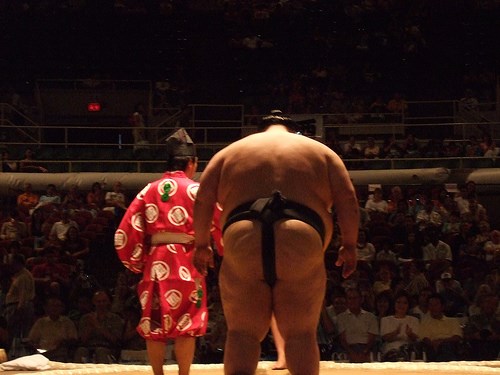Sumo body-slammed by scandal

Sumo is rocked by a scandal involving illegal gambling. Photo (c) by Flickr user hellochris and used under a Creative Commons 2.0 licence.
08.07.2010
By Anton CapriaGambling
This is a scandal that according to multiple sources doesn’t just include wrestlers, but also includes members of the Japan Sumo Association’s (JSA) executive board and “stablemasters” (coaches). The Economist reported that 11 directors of the JSA now face suspension. This includes the chairman of the JSA who was recently replaced amidst the growing scandal.
One of the main revelations has been the widespread gambling by wrestlers on baseball, cards and other games. In Japan, gambling is illegal. This is because gambling holds heavy ties to the yakuza.
The Wall Street Journal reported that sixty-five wrestlers have admitted to gambling. A staggering number in a sport with limited participants. While it isn’t definite that all the gambling is related to the yakuza, The Economist did report that some wrestlers also have been paying blackmail to the mob to keep the organization quiet about their wrong doing.
The first wrestler to be punished for his sins according to The Wall Street Journal is the sport’s second ranked wrestler, Kotomitsuki. He is the reigning champion and according to the source he will be suspended from the sport for life.
Will sumo survive?
Sumo is already a sport lacking much public respect because of its tolerance for transgressions in the sport, according to The Wall Street Journal. This newest scandal has prompted the government to step in and place an outsider as the now acting chairman.
Reform is unavoidable at this point because with the scandal unfolding many wrestlers have been suspended from the upcoming tournament. On top of this many sponsors have dropped their deals with the JSA and more are considering doing the same.
Japanese state broadcaster NHK, has broadcasting rights for sumo matches until March 2013, said it will not show the Nagoya tournament, according to AFP. The competition starts next Sunday and it will be the first time in over half a century that the tournament will not be shown. NHK reported that it had received thousands of calls and emails urging them to cancel their broadcasting of the tournament, said an article from The Wall Street Journal. AFP stated that this will deprive sumo of the $5 million that NHK would have paid to air the tournament.
Sumo is a sport whose reputation has been consistently damaged by scandal, says The Economist. The same article says that the JSA is an organization that has resisted reform. A closed culture policy that much of the public has become fed up with. According to The Economist the Japanese people would like to see the sport undergo the same modernization that much of Japanese society has undergone.





